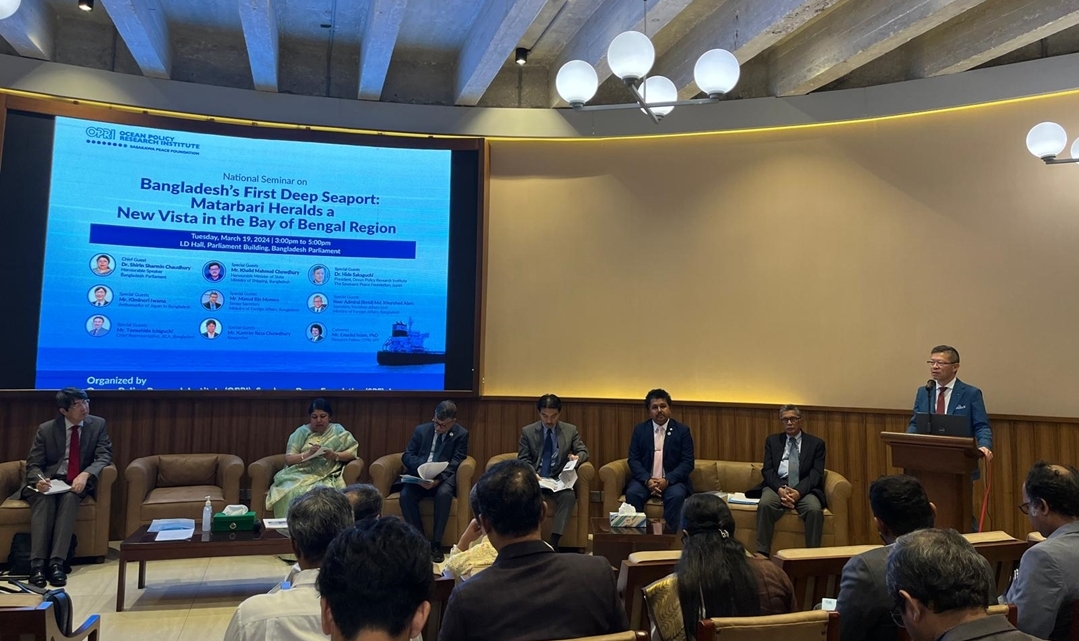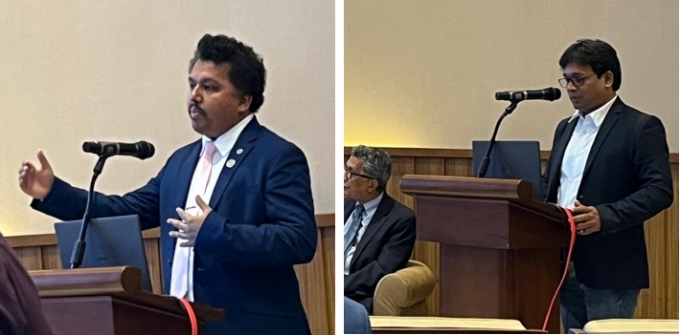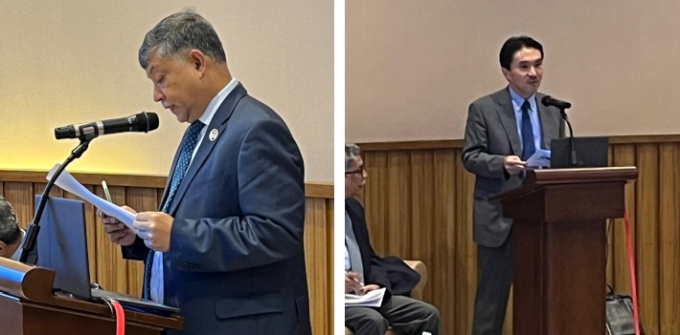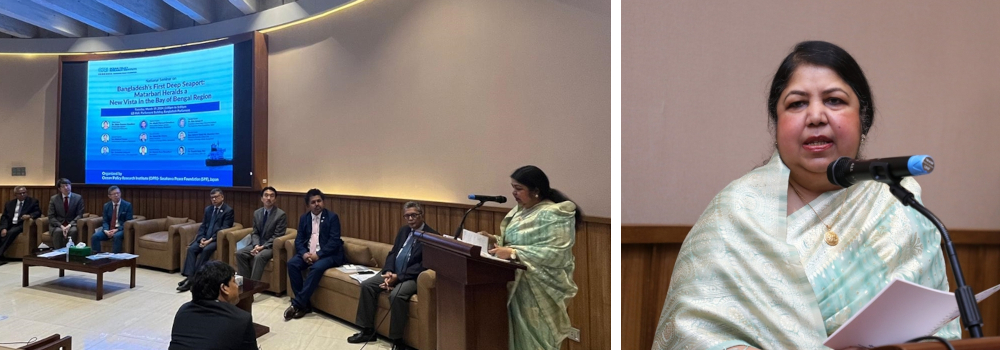News
Event Report
[Event Report] National Seminar On Bangladesh’s First Deep Seaport: Matarbari Heralds a New Vista in the Bay of Bengal Region
2024.05.22
World trade and international freight transport rely mainly on the maritime industry, while the maritime industry in turn depends on the efficient and sustainable operations of ports and shipping businesses. The Indo-Pacific region, specifically the Bay of Bengal, holds a central position in the global oceanic landscape. Asia is the region on which nearly all major, medium, and minor powers are focusing their attention. Japan’s vision of a “Free and Open Indo-Pacific (FOIP)” and the Bay of Bengal region historically have served to connect the eastern and western hemispheres of the world. Japan’s idea of "Multi-layered Connectivity" in the Indo-Pacific fits in with Bangladesh’s growing quest to build quality and useful infrastructure that will turn the country into one of the most attractive places for foreign investment in the entire region.
Bangladesh has pursued a policy of development focused on building massive infrastructure projects with the vision of making Bangladesh a developed country by 2041. Japan has been playing a key role in investing in the infrastructure mega-projects to help attain this dream. Japanese funding for the construction of the first deep seaport at Matarbari in the greater Chittagong will help Bangladesh overcome her deep seaport jinx. Once operational, the Matarbari deep seaport will host big vessels, making it unnecessary for businessmen to depend on Colombo, Kelang and Singapore for importing and exporting. It will reduce shipping costs dramatically. Development of the port will contribute to a wide range of domestic industrial sectors, including the RMG industry. Matarbari Port will promote foreign trade and have a significant economic effect, generating up to a 2% increase in GDP. Once the Matarbari deep seaport is in operation it will likely transform Bangladesh into a regional hub in the Bay of Bengal and South Asian regions.
The Ocean Policy Research Institute, the Sasakawa Peace Foundation (OPRI-SPF), Japan implemented the research project titled “Bangladesh’s First Deep Seaport: Matarbari Heralds a New Vista in the Bay of Bengal Region”. The project was successfully implemented between October 2023 to March 2024.
The national seminar on 19th March 2024 was aimed at sharing the findings with key stakeholders. This seminar was also hosted by OPRI-SPF.
The event was immensely successful, featuring distinguished participants, including Dr. Shirin Sharmin Chaudhury, the Honourable Speaker of the Parliament of Bangladesh and Mr. Masud Bin Momen, Senior Secretary of the Ministry of Foreign Affairs. Also present were Rear Admiral (Retd) Md Khurshed Alam, Secretary (Maritime Affairs Unit) at the Ministry of Foreign Affairs; Hide Sakaguchi, President of the Ocean Policy Research Institute of the Sasakawa Peace Foundation, Japan; Kiminori IWAMA, Japanese Ambassador to Bangladesh; and Tamohide Ichiguchi, JICA Bangladesh Chief Representative.
In his welcome remarks, Dr. Hide Sakaguchi, President of OPRI, shared his greetings and emphasized the gravity and scope of the event. He highlighted the longstanding bilateral relationship between Japan and Bangladesh and expressed his gratitude towards the research lead, Dr. Emadul Islam, and his entire research team for organizing this timely event. Dr. Sakaguchi also reflected on the shared vision of Bangladesh becoming a developed country by 2041.
Bangladesh has pursued a policy of development focused on building massive infrastructure projects with the vision of making Bangladesh a developed country by 2041. Japan has been playing a key role in investing in the infrastructure mega-projects to help attain this dream. Japanese funding for the construction of the first deep seaport at Matarbari in the greater Chittagong will help Bangladesh overcome her deep seaport jinx. Once operational, the Matarbari deep seaport will host big vessels, making it unnecessary for businessmen to depend on Colombo, Kelang and Singapore for importing and exporting. It will reduce shipping costs dramatically. Development of the port will contribute to a wide range of domestic industrial sectors, including the RMG industry. Matarbari Port will promote foreign trade and have a significant economic effect, generating up to a 2% increase in GDP. Once the Matarbari deep seaport is in operation it will likely transform Bangladesh into a regional hub in the Bay of Bengal and South Asian regions.
The Ocean Policy Research Institute, the Sasakawa Peace Foundation (OPRI-SPF), Japan implemented the research project titled “Bangladesh’s First Deep Seaport: Matarbari Heralds a New Vista in the Bay of Bengal Region”. The project was successfully implemented between October 2023 to March 2024.
The national seminar on 19th March 2024 was aimed at sharing the findings with key stakeholders. This seminar was also hosted by OPRI-SPF.
The event was immensely successful, featuring distinguished participants, including Dr. Shirin Sharmin Chaudhury, the Honourable Speaker of the Parliament of Bangladesh and Mr. Masud Bin Momen, Senior Secretary of the Ministry of Foreign Affairs. Also present were Rear Admiral (Retd) Md Khurshed Alam, Secretary (Maritime Affairs Unit) at the Ministry of Foreign Affairs; Hide Sakaguchi, President of the Ocean Policy Research Institute of the Sasakawa Peace Foundation, Japan; Kiminori IWAMA, Japanese Ambassador to Bangladesh; and Tamohide Ichiguchi, JICA Bangladesh Chief Representative.
In his welcome remarks, Dr. Hide Sakaguchi, President of OPRI, shared his greetings and emphasized the gravity and scope of the event. He highlighted the longstanding bilateral relationship between Japan and Bangladesh and expressed his gratitude towards the research lead, Dr. Emadul Islam, and his entire research team for organizing this timely event. Dr. Sakaguchi also reflected on the shared vision of Bangladesh becoming a developed country by 2041.

Dr. Hide Sakaguchi, OPRI president, presenting welcome remarks.
Researchers Dr. Emadul Islam and Mr. Kamran Reza Chowdhury presented findings of research where they made clear that efficient logistics, congestion free hinterland connectivity, skilled human resources, business-friendly tax regime, maximum facilities at competitive prices, and the shortest turnaround time could make the port crucial for the region's development.
During their presentation, the researchers highlighted operational issues in port governance and proposed strategies for transforming Matarbari into a smart port. They recommended that either an experienced private operator from a developed country or a Public-Private Partnership (PPP) management model could ensure the port's development into a world-class, automated smart port.
Mr. Kamran Reza Chowdhury remarked that the Matarbari project is a significant infrastructure success for the government. However, he stressed the need for appropriate policies to ensure the seaport generates substantial revenue, thereby becoming a valuable asset in the Bay of Bengal. This is particularly important given that the project is being financed through loans.
Furthermore, Mr. Reza noted that the government has initiated the formulation of a law to separate the management of Matarbari port from the Chittagong Port Authority, the agency currently executing the Matarbari Port Development Project. This separation is aimed at enhancing the operational efficiency and governance of the port.
During their presentation, the researchers highlighted operational issues in port governance and proposed strategies for transforming Matarbari into a smart port. They recommended that either an experienced private operator from a developed country or a Public-Private Partnership (PPP) management model could ensure the port's development into a world-class, automated smart port.
Mr. Kamran Reza Chowdhury remarked that the Matarbari project is a significant infrastructure success for the government. However, he stressed the need for appropriate policies to ensure the seaport generates substantial revenue, thereby becoming a valuable asset in the Bay of Bengal. This is particularly important given that the project is being financed through loans.
Furthermore, Mr. Reza noted that the government has initiated the formulation of a law to separate the management of Matarbari port from the Chittagong Port Authority, the agency currently executing the Matarbari Port Development Project. This separation is aimed at enhancing the operational efficiency and governance of the port.

(left) Dr. Emadul Islam, Research Fellow of OPRI-SPF, and (right) Mr. Kamran Reza Chowdury, Researcher
Senior Secretary of the Ministry of Foreign Affairs, Mr. Masud Bin Momen, emphasized Japan's significant contribution to the infrastructural development of Bangladesh. He highlighted the Bay of Bengal Industrial Growth Belt initiative as a milestone, with the Matarbari deep seaport being a game changer for the South Asian region. Mr. Momen also recalled his own contributions as Bangladesh's ambassador to Japan in designing this visionary project.
JICA Bangladesh Chief Representative, Mr. Tamohide Ichiguchi, expressed special thanks to the governments of Bangladesh and Japan for initiating this crucial infrastructural development project. In his speech, Ichiguchi underscored the importance of connectivity in the Indo-Pacific region and emphasized that the Matarbari deep seaport would be an instrumental factor in driving economic development.
JICA Bangladesh Chief Representative, Mr. Tamohide Ichiguchi, expressed special thanks to the governments of Bangladesh and Japan for initiating this crucial infrastructural development project. In his speech, Ichiguchi underscored the importance of connectivity in the Indo-Pacific region and emphasized that the Matarbari deep seaport would be an instrumental factor in driving economic development.

(left) Mr. Masud Bin Momen, Senior Secretary, Ministry of Foreign Affairs, Bangladesh, and (right) Mr. Tomohide Ichiguchi, Chief Representative, JICA, Bangladesh
Addressing as chief guest, Parliament Speaker Shirin Sharmin Chaudhury said Matarbari deep seaport is a gateway that will facilitate connectivity with landlocked countries like Nepal and Bhutan through Bangladesh. “Matarbari deep seaport is the right policy decision of Prime Minister Sheikh Hasina,” she said.
The Speaker said that through Matarbari deep seaport, the socio-economic development of the neighbouring countries will take place while Bangladesh will also benefit.
"This seaport will play a crucial role in facilitating communication with different states through waterways and will also increase commercial competition," she added.
The Speaker said that through Matarbari deep seaport, the socio-economic development of the neighbouring countries will take place while Bangladesh will also benefit.
"This seaport will play a crucial role in facilitating communication with different states through waterways and will also increase commercial competition," she added.

Chief guest remarks of Dr. Shirin Sharmin Chaudhury, Honourable Speaker, Bangladesh Parliament.
A total of 100 key stakeholders, including the port chairman, shipping businessmen, academicians, secretaries of different ministries, researchers, journalists, and youth activists joined in this successful event.
This event was received wide media coverage and a total of 25 print and electronic national and international media published reports.
Media link
Matarbari seaport will play crucial role for regional connectivity: Speaker - United News of Bangladesh
https://unb.com.bd/category/Bangladesh/matarbari-seaport-will-play-crucial-role-for-regional-connectivity-speaker/132779
workshop on "Bangladesh's First Deep Sea Port: Matarbari Heralds a New Vista in the Bay of Bengal Region" - Bangladesh Parliament
https://www.parliament.gov.bd/major-activities-gallery/87
VOA Bangladesh
https://www.voabangla.com/a/7534078.html\
This event was received wide media coverage and a total of 25 print and electronic national and international media published reports.
Media link
Matarbari seaport will play crucial role for regional connectivity: Speaker - United News of Bangladesh
https://unb.com.bd/category/Bangladesh/matarbari-seaport-will-play-crucial-role-for-regional-connectivity-speaker/132779
workshop on "Bangladesh's First Deep Sea Port: Matarbari Heralds a New Vista in the Bay of Bengal Region" - Bangladesh Parliament
https://www.parliament.gov.bd/major-activities-gallery/87
VOA Bangladesh
https://www.voabangla.com/a/7534078.html\
(by Emadul Islam, Research Fellow, OPRI)